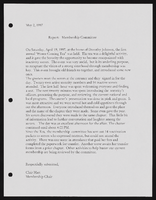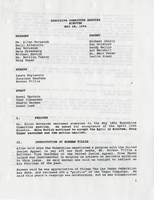Search the Special Collections and Archives Portal
Search Results

Alpha Kappa Alpha Sorority, Theta Theta Omega Chapter membership committee reports
Date
Archival Collection
Description
From the Alpha Kappa Alpha Sorority, Incorporated, Theta Theta Omega Chapter Records (MS-01014) -- Chapter records file.
Text
William Geagley Collection on Nuclear Safety
Identifier
Abstract
The William Geagley Collection on Nuclear Safety contains government publications, memoranda, and pamphlets about counteracting nuclear contamination of food supplies from 1951 to 1960. The materials primarily document Geagley’s oversight of the development of food safety contingency plans for the Michigan Department of Agriculture. The materials also contain information relating to the Nevada Test Site’s plans for Operation Plumbbob, atmospheric and underground nuclear tests held in 1957 in Nevada.
Archival Collection

Francisco Rufino Parra interview, December 6, 2018: transcript
Date
Archival Collection
Description
Interviewed by Barbara Tabach. Born in Mexico, Francisco was a child when his father received permission to immigrate to the US with his younger children. Upon graduating from high school in California, he moved to Las Vegas where one of his sisters lived. It was 1994 and jobs were plentiful; he would find his way through several positions. Then in early 2000 he was hired to be a dishwasher, on the graveyard, at the recently opened Paris Hotel. It was a Culinary Union job; by 2002 he was a shop steward and finding better positions at Paris. He continues to work at the Paris Hotel as a fry cook. In 2008, he was a citizen and proudly voted in his first presidential election.
Text

Ricardo Torres-Cortez interview, May 7, 2019: transcript
Date
Archival Collection
Description
Interviewed by Barbara Tabach. Monserrath Hernández and Maribel Estrada Calderón also participate in the questioning. Born in Mexico, came to live in Las Vegas in 1985. Graduate of UNLV in Journalism and a reporter of Public Safety for the Las Vegas Sun. Ricardo covered the 1 October shooting, the killing of two police officers and other traumatic news of the community.
Text

Transcript of interview with Marion Brooks by Kathleen Kasmir, February 24, 1975
Date
Archival Collection
Description
On February 24, 1975, Kathleen Kasmir interviewed Marion Brooks (born 1913 in Santa Ana, California) about his life in Southern Nevada and his work as a mining engineer. Brooks first talks about his background before talking extensively about his early work in mining. Brooks also mentions some of the professional mining societies of which he was a part, and the two then move on to discuss gambling, recreational activities, and the atomic testing. Other topics covered during the interview include the price of groceries and food, the El Rancho Vegas, social changes, population growth, and environmental changes. The end of the interview then shifts back to Brooks’ work in mining at Blue Diamond and then a discussion on the possible locations of three lost mines.
Text

Transcript of interview with Clark Crocker by Monica Lehman, March 3, 1978
Date
Archival Collection
Description
On March 3, 1978, Monica Lehman interviewed Clark Crocker (born 1920 in Westfield, Massachusetts) about his experiences while living in Nevada. Crocker first talks about his family and educational background before describing his experiences from going to school in both California and Massachusetts. Crocker then describes what he knows about the building of Hoover Dam and later talks about his career as a teacher and school principal. The two also discuss Crocker’s hobbies and volunteer work, including that for the fire department in Pahrump, and they later discuss Crocker’s experiences as both a frogman and navigator for the United States Navy during World War II. The interview concludes with some of Crocker’s thoughts and philosophies on how curriculum should be structured in schools.
Text

Irene Cepeda interview, April 24, 2019: transcript
Date
Description
Interviewed by Monserrath Hernández, Nathalie Martinez and Rodrigo Vázquez. Irene Cepeda is a woman dedicated to serving the Latinx as well as all minority groups in education in Southern Nevada. As a Las Vegas native, she grew up alongside the Latinx community here and is a proud Latina from Nicaraguan roots. She is dedicated to uplifting the Latinx community through her work with the Latino Youth Leadership Conference and college access specialist at Nevada State College. Now, as representative of District D on the Clark County School District Board of Trustees, she seeks to tackle the issues the district faces from acts of White supremacy to a lack of funding for English Language Learner families.
Text

Transcript of interview with Harry Kogan by Barbara Tabach, January 12, 2016
Date
Archival Collection
Description
With a liveliness of a man decades younger, Harry Kogan looks at his 100th birthday with cheer and satisfaction. Born March 11, 1916 to poor Russian immigrant parents in the Jewish ghetto of Philadelphia, Harry vividly recalls walking to school shoeless, with no hat or no raincoat. A treat would be his mother handing him ten-cents to go to the theater and enjoy a silent movie. After graduating from high school in 1933, Harry quickly took one of the rare jobs available in a garment manufacturing company where he worked his way into being a skilled and valued fabric cutter-a job that paid $35 a week. Harry was raised with two brothers and lived in Philadelphia for the first 91 years of his life before moving to Las Vegas. One of his brothers learned the refrigeration business while enlisted in the Navy and after the war formed a commercial refrigeration business named Kogan Brothers. Harry is a philosophical and philanthropic man. He was slow to retire and traveled the world, took classes and donated to his favorite causes; among which are the Boys Town Jerusalem and the Jewish Federation of Las Vegas. He sat for this interview to honor his Jewish roots, to share his life experiences and spending the past years in Las Vegas.
Text


